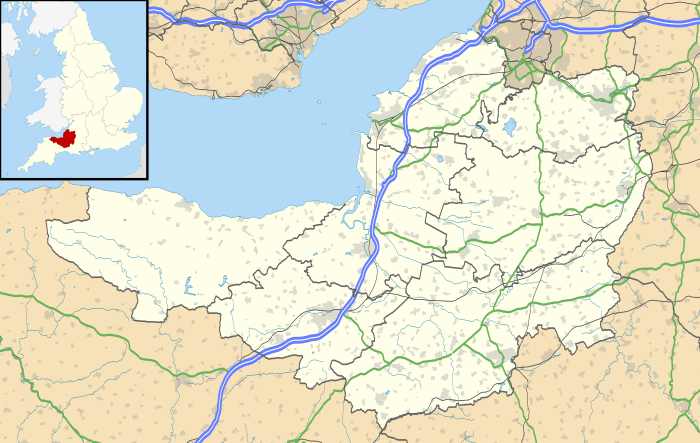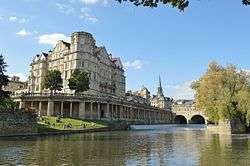Empire Hotel, Bath
| Empire Hotel | |
|---|---|
|
From the south showing Pulteney Bridge | |
| Location | Bath, Somerset, England |
| Coordinates | 51°22′56″N 2°21′28″W / 51.38222°N 2.35778°WCoordinates: 51°22′56″N 2°21′28″W / 51.38222°N 2.35778°W |
| Built | 1901 |
| Built for | Alfred Holland |
| Architect | Major C E Davis |
Listed Building – Grade II | |
| Official name: Empire Hotel | |
| Designated | 17 July 1989[1] |
| Reference no. | 448647 |
 Location of Empire Hotel in Somerset | |
The Empire Hotel in Bath, Somerset, England was built in 1901 and has been designated as a Grade II listed building.[1] It is situated on Orange Grove close to both Bath Abbey and Pulteney Bridge.

It was designed by the Bath City Architect Major Charles Edward Davis for the hotelier Alfred Holland and built from Bath Stone,[1] on the site of the Athenaeum. It was described by Sir Nikolaus Pevsner as a ‘monstrosity and an unbelievable piece of pompous architecture’.[2]
The building occupies a large L shaped block. It is six storeys high plus the octagonal corner tower. The front of the building onto Orange Grove has eight bays and the side overlooking the River Avon has nine bays.[1]
The architecture of the roof shows the three classes of people, Castle on the corner for Upper Class, A House for the Middle classes and a cottage for the lower classes.
During World War II it was used by the Royal Navy as a postal sorting offices and remained in their possession until the 1990s.[3] It was then was refurbished and became apartments and a restaurant.[4][5]
References
| Wikimedia Commons has media related to Empire Hotel, Bath. |
- 1 2 3 4 "Empire Hotel". Images of England. English Heritage. Retrieved 31 December 2010.
- ↑ "Empire Hotel". Bath Virtual Fieldtrip. Plymouth University. Retrieved 26 November 2012.
- ↑ "Empire Hotel". Bath Heritage. Retrieved 26 November 2012.
- ↑ "The Empire Hotel in Bath". Madison Oakley. Retrieved 26 November 2012.
- ↑ "The Empire". Retirement Housing. Retrieved 26 November 2012.
